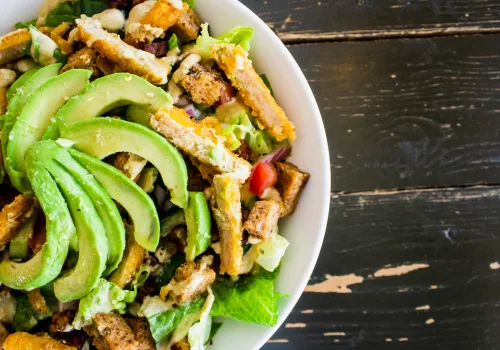Eating a diet abundant in whole foods renowned for their stress-relieving attributes can be a game-changer when it comes to managing stress levels effectively. The beauty of food therapy lies in its simplicity and its natural approach to enhancing well-being. Let’s delve deeper into how these foods work and how you can incorporate them into your daily life. Dark chocolate is not just a treat; it’s a powerful ally in stress reduction. Rich in antioxidants, it can help lower the levels of cortisol, the infamous stress hormone, thus promoting a sense of calm and relaxation. Aim for a small piece of high-quality dark chocolate daily, with at least 70% cocoa content, to harness these benefits without consuming excess sugar. Fatty fish, such as salmon, mackerel, and sardines, are packed with omega-3 fatty acids, which are crucial for brain health and have been linked to reduced anxiety and improved mood. These healthy fats support brain function by reducing inflammation and promoting effective communication between brain cells. Try to include two servings of fatty fish in your weekly meal plan—grilled salmon with a side of leafy greens is both delicious and stress-busting.
Dark Chocolate: A Sweet Stress Reliever
It’s not just the rich taste of dark chocolate that makes it a favorite; it’s the way it interacts with your body. Dark chocolate contains flavonoids, which have been shown to improve mood and cognitive function. A study published in the Journal of Psychopharmacology found that participants who consumed dark chocolate reported feeling calmer and more content.
Practical Tip: Incorporate dark chocolate into your diet by adding shavings to your morning oatmeal or enjoying a small square with a cup of green tea. Remember to savor it slowly to fully appreciate its calming effects.
Deep Dive: The role of flavonoids extends beyond mood improvement. They help in increasing blood flow to the brain, which can enhance overall cognitive function and promote a sense of well-being. When choosing dark chocolate, prioritize organic options that are free from additives and excessive sugars, ensuring you’re getting the purest form of this stress-relieving treat.
Omega-3 Rich Fish: Brain and Mood Boosters
Omega-3 fatty acids, particularly EPA and DHA, play a vital role in maintaining mental health. They can help reduce inflammation and promote serotonin production, which is crucial for mood regulation. Research in The American Journal of Clinical Nutrition suggests that individuals with higher omega-3 intake experience fewer symptoms of depression and anxiety.
Real-Life Example: Consider preparing a simple salmon dish by marinating it in olive oil, lemon juice, and herbs, then baking it in the oven. Pair it with quinoa and steamed vegetables for a balanced, stress-relieving meal.
Extended Advice: Diversify your omega-3 sources by incorporating other seafood like sardines and mackerel into your menu. For those who prefer plant-based options, chia seeds, flaxseeds, and walnuts are excellent alternatives. These can be easily added to smoothies, salads, or even baked goods, providing an omega-3 boost without the need for fish.
Magnesium: Nature’s Chill Pill
Magnesium is a mineral that directly influences neurotransmitters in the brain, helping to control mood and stress levels. Leafy greens like spinach, along with nuts and seeds, are excellent sources of magnesium. This mineral acts as a natural relaxant, soothing tense muscles and calming the nervous system.
Actionable Advice: Start your day with a magnesium-rich smoothie. Blend spinach, banana, almond milk, and a tablespoon of almond butter for a nutrient-packed breakfast that sets a calm tone for the day.
In-Depth Insight: Magnesium is often referred to as the “relaxation mineral” due to its ability to regulate the body’s stress response system. In times of stress, magnesium levels can be depleted, so it’s essential to maintain adequate intake. Consider magnesium supplements if you’re unable to meet your needs through diet alone, but always consult a healthcare provider before starting any new supplement regimen.
Green and Herbal Teas: Sipping Away Stress
Swapping your usual caffeinated coffee for a calming cup of tea can make a significant difference. Green tea contains L-theanine, an amino acid known for promoting relaxation without drowsiness. Herbal teas, such as chamomile, peppermint, and lavender, offer soothing effects and are caffeine-free, making them perfect for winding down in the evening.
Practical Tip: Create a bedtime ritual by enjoying a warm cup of chamomile or lavender tea about 30 minutes before sleep. Adding a slice of lemon can enhance the calming effect and provide a dose of vitamin C.
Exploration: Each type of tea offers unique benefits. For instance, peppermint tea is known for its digestive properties, which can be particularly helpful if stress affects your stomach. Meanwhile, lavender tea can improve sleep quality by reducing anxiety. Experiment with different varieties to discover what works best for you, and consider loose-leaf teas for a more robust flavor and additional health benefits.
Potassium Powerhouses: Avocados and Bananas
Avocados and bananas are more than just popular smoothie ingredients; they’re stress-relief staples. Potassium helps regulate blood pressure, which can rise in response to stress. Bananas also contain tryptophan, which the body converts to serotonin, promoting a sense of well-being.
Case Study: A study in Nutritional Neuroscience highlighted the calming effects of potassium-rich foods. Participants consuming a diet high in potassium reported lower stress levels and improved mood.
Daily Tip: Add sliced bananas to your morning cereal or blend an avocado into a smoothie for a creamy texture and nutritional boost.
Further Exploration: Potassium is not only crucial for stress management but also plays a vital role in muscle function and fluid balance in the body. Incorporate other potassium-rich foods like sweet potatoes and pomegranates into your meals. These can provide variety and additional nutrients that support overall health and stress resilience.
Whole Grains: Steady Energy for a Steady Mood
Whole grains like oats, quinoa, and brown rice are complex carbohydrates that ensure a slow release of glucose into the bloodstream. This steady energy prevents mood swings and supports stable blood sugar levels, crucial in stress management.
Example Meal: Start your day with a comforting bowl of whole-grain oatmeal topped with fresh berries and a sprinkle of seeds for added magnesium and zinc.
Detailed Insight: The fiber in whole grains also contributes to digestive health, which is intrinsically linked to emotional well-being. A healthy gut promotes the production of neurotransmitters that regulate mood. To maximize benefits, choose minimally processed whole grains and consider incorporating ancient grains like farro and millet into your diet for a diversity of textures and flavors.
Fermented Foods: The Gut-Brain Connection
The gut plays a crucial role in mental health, often referred to as the “second brain.” Yogurt and fermented foods like kimchi and sauerkraut are rich in probiotics, which support a healthy gut microbiome and, in turn, improve mood and reduce stress.
Practical Tip: Incorporate a serving of yogurt into your breakfast routine or enjoy a side of fermented vegetables with your meals to boost digestion and mood.
In-Depth Understanding: Probiotics found in fermented foods can enhance the gut’s production of neurotransmitters like GABA, which has calming properties. Regular consumption of these foods can lead to a more resilient gut, capable of better managing stress and supporting overall mental health. For those with dietary restrictions, consider probiotic supplements as an alternative to fermented foods.
Nuts and Seeds: Tiny Nutritional Powerhouses
Nuts and seeds are rich in stress-reducing nutrients like magnesium, zinc, and vitamin E. These nutrients support the body’s ability to combat oxidative stress, which can be heightened during stressful times.
Daily Habit: Grab a handful of mixed nuts as an afternoon snack or sprinkle seeds over salads and stir-fries for added crunch and nutritional benefits.
Extended Exploration: Each type of nut and seed offers unique benefits. For example, almonds are high in vitamin E, which helps protect against oxidative damage, while pumpkin seeds are an excellent source of zinc, crucial for maintaining a healthy immune system. Rotate your choices to ensure a broad spectrum of nutrients, and consider roasting nuts yourself to avoid unhealthy additives found in some store-bought varieties.
Citrus Fruits: Vitamin C for Stress Reduction
Vitamin C, abundant in citrus fruits, is essential for adrenal gland function, which plays a critical role in the body’s stress response. Regular intake of vitamin C can help lower cortisol levels and promote a sense of calm.
Example: Enjoy a refreshing citrus salad made with oranges, grapefruit, and a touch of mint for a vitamin C boost that refreshes both body and mind.
Further Insight: Beyond citrus fruits, other excellent sources of vitamin C include strawberries, kiwi, and bell peppers. Integrate these into your diet with colorful salads, smoothies, or as healthy snacks. Vitamin C not only supports stress reduction but also boosts the immune system, which can be compromised during prolonged stress.
Cruciferous Vegetables: Nutrient-Dense Stress Fighters
Broccoli and kale are not only rich in vitamins C, A, and K, but they also provide folate and fiber, supporting overall health and immune function. These nutrients are vital during times of stress when the immune system can be compromised.
Cooking Tip: Steam broccoli and kale lightly to preserve their nutrients, and drizzle with olive oil and lemon juice for a simple, stress-relieving side dish.
Extended Understanding: Cruciferous vegetables also contain sulforaphane, a compound with potential anti-depressant effects due to its ability to reduce inflammation and oxidative stress. To make the most of these benefits, include a variety of cruciferous vegetables in your meals, such as Brussels sprouts and cauliflower, and pair them with healthy fats like olive oil to enhance nutrient absorption.
Lean Proteins: Building Blocks for Mood
Lean proteins such as chicken, turkey, and tofu are packed with amino acids essential for producing mood-regulating neurotransmitters like dopamine and serotonin. These proteins help maintain a balanced mood and reduce stress.
Meal Inspiration: Grill chicken breasts with herbs and serve with a side of quinoa and steamed vegetables for a protein-rich, stress-busting dinner.
Further Exploration: Beyond traditional meats, consider plant-based proteins like lentils and beans, which are not only rich in protein but also provide fiber and essential nutrients. These can be used in stews, salads, or as meat substitutes in various dishes. Diversifying your protein sources supports a balanced diet and contributes to a sustainable lifestyle.
By embracing a diet rich in these stress-relieving foods, you not only manage stress more effectively but also enhance your overall health and well-being. Focus on incorporating a variety of whole, nutrient-dense foods to support a healthy gut microbiome, balanced neurotransmitter function, and stable blood sugar levels, paving the way for optimal stress relief. Remember, the journey to stress management is as much about enjoying the food as it is about the nutrients they provide.
To further enhance your stress management strategy, consider adopting mindful eating practices. Slow down and savor each bite, paying attention to the flavors, textures, and aromas. This can transform meals into a meditative experience, helping to ground you in the present moment and reduce overall stress.






